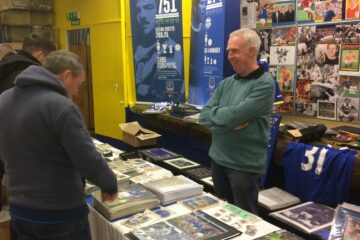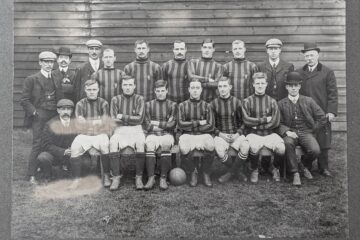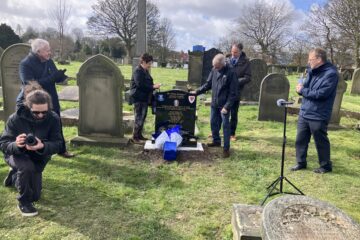Rob Sawyer in Conversation with Martin Dobson (speaking in October 2013)
The 1970’s success at Anfield cast a long, dark, shadow across Stanley Park to Goodison. Blue beacons of light were few and far between but, perhaps, Martin Dobson shone brightest.
Christened “Sir Dobbo” by Andy King, in humorous deference to the class he exuded on and off the pitch, this thoroughbred midfielder’s arrival from Burnley in August 1974 signalled the departure of the last member of the Holy Trinity. Cultured and powerful with an eye for goal – there is no greater compliment than to state that he would not have looked out of place in the squad of 1969-70. In a five-year stay which yielded 40 goals in 230 appearances he upheld the values of Nil Satis Nisi Optimum.
Now Martin is back at Goodison as a match day host and cheering the Blues. I was privileged to spend on hour in conversation with the East-Lancastrian discussing Burnley, England, Everton, saxophones and singing in the shower.
My Dad was a Blackburn Rovers supporter in the Ronnie Clayton days and he’d take us to Ewood, so when I was coming through at school I was hoping that Rovers would come in for me – however they never did. Bolton Wanderers, in the old Second Division, wanted me to sign as an apprentice, but I decided to complete my A levels – so I just played for Bolton when I wasn’t playing for the school or county team. During that time, a lot of other clubs like Burnley, Manchester City and Arsenal showed interest but my dad said “No, he’s going to Bolton.” They’d then ask “What has Martin actually signed with Bolton?” and Dad said, “Nothing. We just shook hands!”
When Bolton released me after one season as a pro, they didn’t tell me to my face – they just sent me a recorded delivery letter. So my dad said “I think you deserve another chance son, let’s try Burnley as they have a good reputation.”

Burnley’s boss, Harry Potts, invited me down for a couple of weeks, and that was all the incentive I needed – I grafted and got fit. It was brilliant there; the coaching under Jimmy Adamson was excellent. It was all on the deck – two touch football: control, pass and move. All of a sudden my confidence came back and I loved it. Coming from Bolton it was like chalk and cheese. Burnley were ahead of their time – in the top division for over 20 years battling bigger clubs – and they gave young players a chance: Dave Thomas was a brilliant kid who could have gone to any club yet he chose Burnley.
So I signed – £20 a week, Magic! There were no agents around in those days…or I may have got another fiver!
Harry was the enthusiast, very positive, whilst Jimmy was the ultimate technical coach who taught us how the play the right way – they were the perfect combo. I was a striker, but they realised that I liked the ball at my feet and was confident in possession. Jimmy had been converted from a striker to a wing-half so he might have seen something that he could identify with in my play. So I tried midfield and I loved it, as I was fully involved in the game and, as an ex-striker, could still get in the box and score.
I played in the England Under-23 team after I became a regular at Turf Moor – my first cap was in the 69-70 season against Bulgaria, but the following pre-season I broke my leg and dislocated my ankle at Middlesbrough’s Ayresome Park. When I came off the field my foot was pointing in the wrong direction but I was very lucky that the England team doctor was also the ‘Boro doctor. He got it back in place – then I went to hospital for an x-ray. The leg was broken; it was a straight fracture which healed in 6 weeks, but the ligaments took three months and Burnley were bottom of the division by that time. Jimmy said we’d be “team of the 70s,” but we promptly got relegated in 1971.

We were promoted back to the top level within two seasons, and by the time I left Burnley I had broken through to the England squad. Alf Ramsey was under pressure and had changed the team around – my first cap was a friendly game against Portugal in 1973.When I played for England it was alongside Colin Bell and Trevor Brooking, and when Joe Mercer took over as caretaker manager it worked well. But then Don Revie came in and introduced other players. Dave Thomas should have had more caps – but it’s all about opinions.
At the start of the 1974-75 season, Burnley had to sell a player to finance the building of a new stand. At that time, Leighton James and I could command a £250,000-300,000 fee. It did come as a bit of a shock to me. I was captain of the club, but after playing against Ipswich on the Saturday the deal was done on the Monday: I met Billy Bingham at Turf Moor and it was all sorted in 10 minutes. I was delighted to join such a fantastic club.
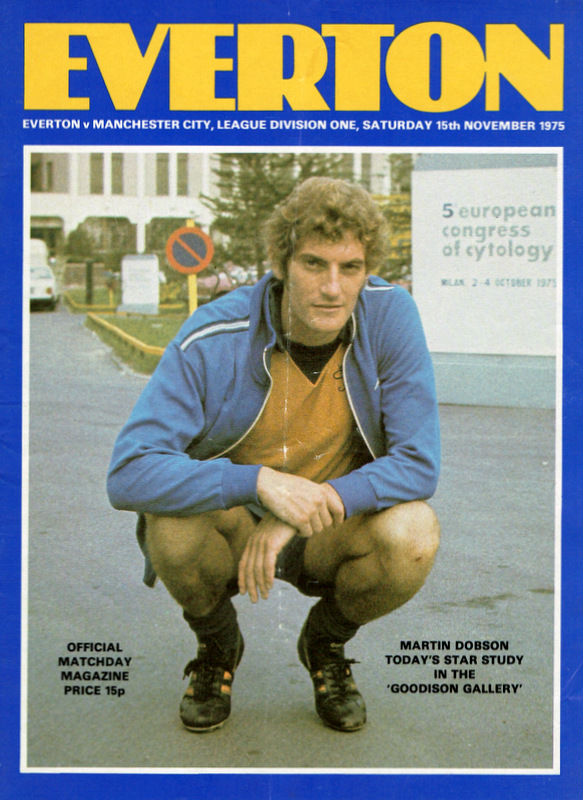
I knew about the history of the great Everton midfield of Harvey, Kendall and Ball. By then Howard – a wonderful player – had left for Birmingham, whilst Bally had gone and Colin was struggling with a hip problem. Dave Clements was in centre-midfield, with Gary Jones and John Connelly on the flanks – so I slotted into midfield. Roger Kenyon was captain and Dave Lawson was vying with Dai Davies for the goal keeper slot. We almost won the league that season. I remember scoring against Coventry on Easter Monday to put us top of the division, but we couldn’t see it through.
Everton is a massive club and the atmosphere at Goodison was great, but I was coming away sometimes thinking that the fans wouldn’t have enjoyed watching us play at that time – we were getting the right results, but the entertainment factor was missing. I came from a team, Burnley, where we were always on the front foot: get it wide, be creative, lots of crosses and shots on target. Training sessions were hard under Billy, everything was timed like 200m and 400m runs. Long-term it did give me the core strength to extend my career.
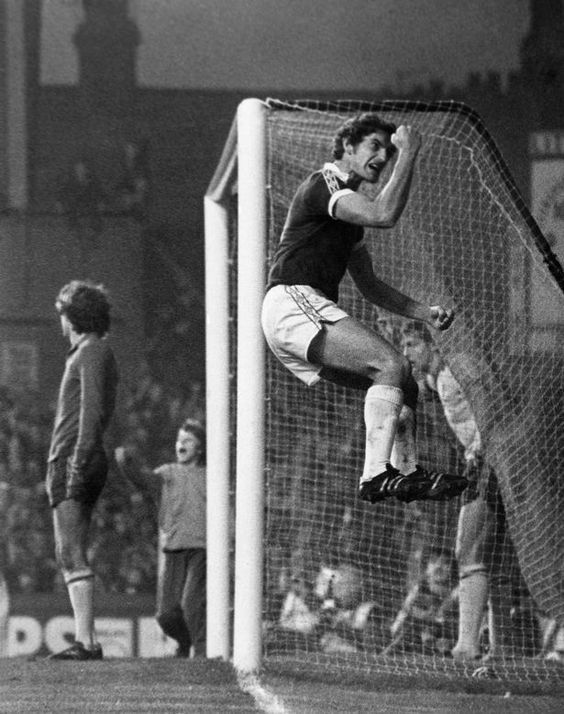
I really enjoyed my last three years at Everton. Gordon Lee had taken over and we played a more expansive game: ball on the deck, create chances, score goals and win games. In 1977-78 we went 23 games without defeat; we had a good team with Lyonsey, Pejiy, Kingy, Rossco, Ticer Thomas and Big Latch, whilst Dunc McKenzie was a real crowd favourite. We also had a good work ethic and honest players, willing to graft. However, in the end we again finished third; we did have a few injuries in the last six or seven games but it was so disappointing. We wanted it so badly, and so did the fans.
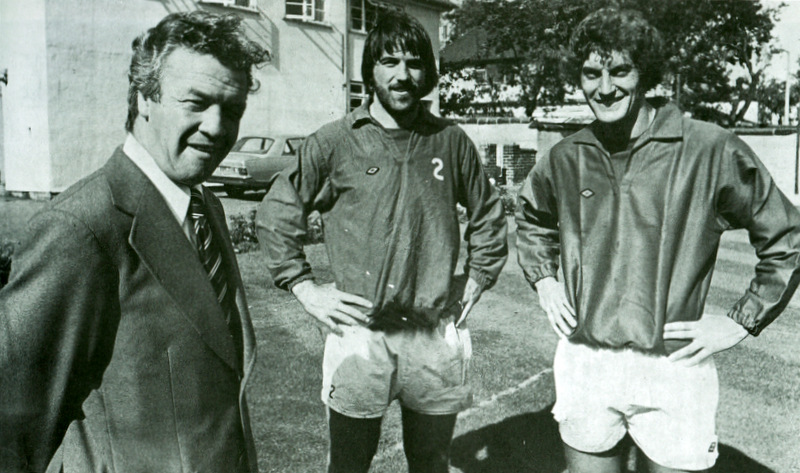
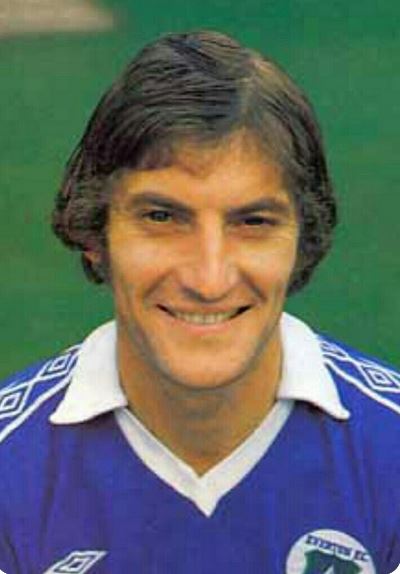
I feel that the League Cup Final against Villa was a big chance to win a trophy, if we had I’m sure it would have led to other triumphs. It wasn’t to be in the FA Cup either was it? We felt gutted by the decision of ref Clive Thomas to disallow Bryan Hamilton’s legitimate winner in the Maine Road semi-final derby game.
I left Everton in 1979 and it was a bad decision – Gordon had offered me a contract, but I wanted a longer one after having had a successful season. Harry Potts had gone back to Burnley after a period at Blackpool. I met him in Southport and he asked me to come back to Burnley. I felt I needed to repay his faith he had in me for giving me the chance all those years ago. I had a special relationship with Harry, himself a former Evertonian, and wanted to pay him back. It was my heart ruling my head.
But when I got back to Burnley it wasn’t the club I’d left – the discipline had gone and Jimmy Adamson wasn’t there anymore. I realised I’d made a mistake but you make your decisions and sometimes they work out and sometimes they don’t. I should have stayed at Goodison; I felt I could have moved to central defence. We could have played it out from the back and kept possession -but you can’t turn the clock back.
Coming to Everton was a huge change for me. I’d joined Burnley on a ‘free’ where nothing was expected of me. Now at Everton I’d cost £300,000 and the expectation levels were completely different. I was trying hard to adjust to the move but it was tough and my confidence was a little down. One day I thought “I want to stay at Everton. I’m going to go out and give it my best shot, be more aggressive and put myself about. I want to be part of a successful Everton team and get on the coat-tails of the club across the road.” It worked. Driving myself forward like that became the turning point. You had to do this yourself – there were no sports psychologists in those days.

Towards the end of my second spell at Burnley, when I was 35, we were in the Second Division and good players were coming through the youth system like Brian Laws, Trevor Steven and Mike Phelan. It was clear that Trevor would be a top talent even as a seventeen year-old. He was brilliant – and what a nice lad. I saw him the other week and he said “Hey Dobbo, do you remember when you came into the gym in pre-season and I had my socks rolled down? You said, ‘Hey, Tricky, look smart-play smart!’ – so I pulled them up!” Howard came to see one of our games at Burnley and afterwards gave me a bell. I thought, “Hey – Howard wants me back at Everton, great!” but Howard put me straight. “No Dobbo – it’s about Trevor Steven, what’s he like?” I said, “Howey, just sign him, whatever it costs.”
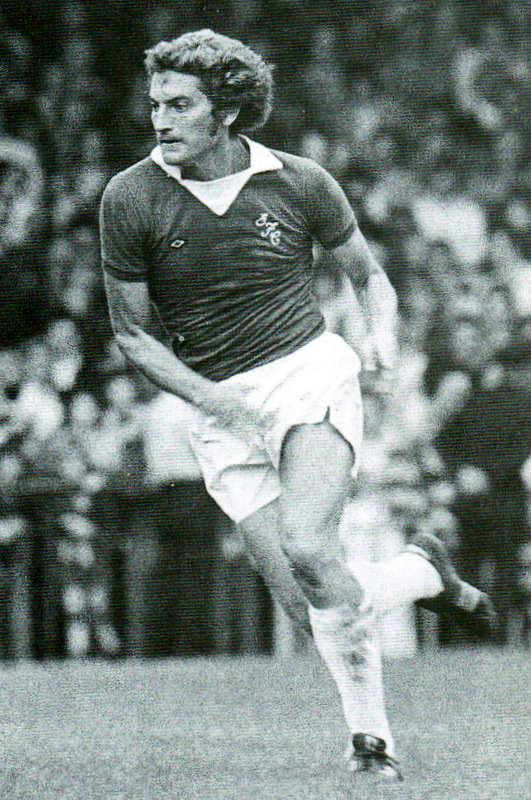
Then John Bond came in as manager of Burnley and made it clear that he wanted me away. Bury were looking for a player-manager so I thought I’d give it a go. I enjoyed it but it was tough. There were only four people on the coaching staff and 16 players. In the close-season I went round looking at a lot of reserve games and then released nine of our players.I was lucky that I was able to draft in Andy Hill from Manchester United, Jamie Hoyland from City, David Lee, Leighton James and Trevor Ross – all on frees. We had a mixture of experience and good young talent. It came together the following season when we got promoted; I was there five years and we maintained our position.
The likes of Lee Dixon, who I picked up on a free from Chester, also came through the ranks and then I signed Mark Higgins. Mark had retired at Everton but the injury settled down and he gained a contract at Manchester United. I saw him play in a reserve game and thought: “Wow – he’d do a great job for us.” We could only offer around £10,000, so Alex Ferguson agreed a 50% sell-on if we sold Mark on for a bigger fee. Higgy did a brilliant job – a real leader; he organised the defence, took responsibility and was a great pro. He was also very popular in the dressing room. A lot of other clubs came in for him, but at that time I couldn’t replace him. In the end something had to give. So I went to see Sir Alex and he said that United would take 50% of anything under £100,000. In the end we sold Mark to Stoke City for £150,000. So everybody was happy: Higgy was playing higher level football and Bury made around £100,000. What’s more, Alex helped a young manager and a small club like Bury. Mark is now hosting one of the suites at Goodison on match days, so it is great to see him again.

After Bury, I ended up at Bristol Rovers for a few months but it just didn’t work out. Since then I’ve been involved in youth football. I was the Academy Director at Bolton Wanderers when, former Evertonian, Colin Todd was manager, and then I held a similar position at Burnley FC. I left that position two years ago, and took up a scouting position with Leicester City, which is ongoing.

Around that time Harry Ross from the Everton Former Players Foundation got in touch and said they were looking for a former player to host the Dixie Dean Lounge on match days. “Would I fancy it?” My answer: “Absolutely Harry, without question.” I’m still a footie fan and I didn’t hesitate, because during those other years I hadn’t been able to see games at Goodison because of other commitments. I love it – just walking through the doors for that first game felt like I was coming home. It has brought back so many happy memories and the people are fantastic.
Everton is so special – a proper football club run the right way, all way from Chairman Bill right throughout all the departments. My wife shouts at me when I’m in the shower and I’m doing my own rendition of “It’s a grand old team to play for…” – she comes in and starts throwing squashed tomatoes at me! I’ve just started playing the saxophone; not too good at the moment, but I’d love to get some sheet music to that song. They say you need to do about 10,000 hours practice to do anything to a good standard; I’ve just worked it out so I’ll be around 125 when I’ll be any good!
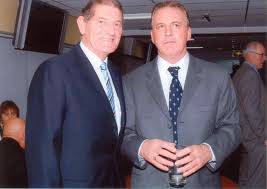
Since watching the lads regularly I feel they’ve been excellent; they couldn’t have given any more in commitment, work ethic and graft. That’s continued at the start of this season; for me every player is playing to their maximum every week. We’ve got some absolutely top notch bunch of players. To have only lost one League game so far is fantastic. And the wins against Chelsea and Newcastle have set a real bench-mark for the season. It’s been a great start for Roberto and his staff.
People have asked me if there are players in the present squad who were similar to myself. I feel everyone is an individual. We all have strengths and weaknesses but one thing’s for sure – the game has moved onto another level in all areas: the pitch condition, fitness levels, conditioning, sports science, nutrition… everything. Just look at the physique of Ross Barkley, he’s formidable: only 19 years of age but 6 2” with fantastic strength and ability – in fact all the assets to be a top player. Romelu is the same. So it’s all looking good, we’ve now got a great balance of experience and youth with Gerard, Stonesy, Ross and Romelu.
Whatever happens will happen, but one thing’s for sure: the fans love Everton Football Club and they lift the players on match days. What an atmosphere they produce – I know that for a fact. It still gives me a real tingle, even now as a fan, when the lads run out to the first beat of the Z-Cars theme. Bring it on!
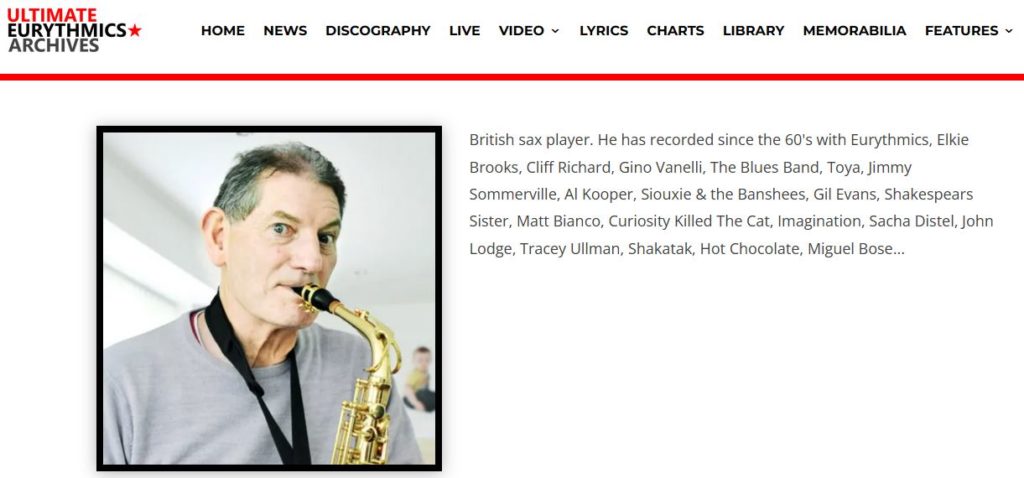
Their web admin has unfortunately confused Martin Dobbo with his namesake, professional sax player Martin Dobson (below). Should we tell them?


